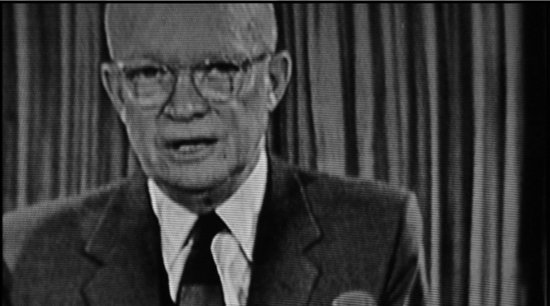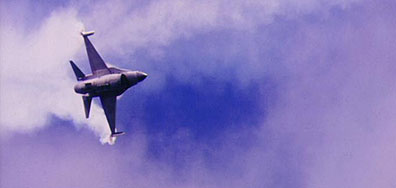“This sweltering summer of the Negro’s legitimate discontent will not pass until there is an invigorating autumn of freedom and equality. Nineteen sixty-three is not an end, but a beginning.” Ground is broken on the new MLK memorial, to be “built along the edge of the Tidal Basin, midway between monuments to Thomas Jefferson and Abraham Lincoln. It will be the first on the Mall honoring an African American and the first that does not memorialize a president or a war hero.” Great! As I’ve said before in this space, I’m all in favor of adding more historically-themed monuments to the Mall, and a tribute to Dr. King seems a particularly worthy addition to our nation’s central gathering place.
Category: Truman to Eisenhower
Matters of State.
“The position of secretary of state is potentially the most fulfilling in the government short of the presidency. Its scope is global; ultimately it rests on almost philosophical assumptions as to the nature of world order and the relationship of order to progress and national interest.” In this past Sunday’s NYT Book Review, Henry Kissinger remembers his predecessor, Dean Acheson. “Acheson dealt with the issues Nixon put before him thoughtfully, precisely, without any attempt at flattery, in pursuit of his conception of national service and, unlike some other outside advisers, without offering advice that had not been solicited.“
Truman/False?
“The idea that Truman and Dean Acheson could be hauled out as exhibits for preventive war in Iraq against ‘abject pacifists’ such as myself made me feel that I was living in Oceania, and the Ministry of Peace had rewritten the textbooks to prove that the legacy of a president who rejected preventive war in fact constituted the best justification for it!” By way of my friend Mark, Peter Beinart and Michael Tomasky go toe-to-toe over the legacy of ’48 at Slate‘s Book Club. I’m inclined to agree with the latter.
Hard Times.
“‘Having been blacklisted from working in television during the McCarthy era, I know the harm of government using private corporations to intrude into the lives of innocent Americans. When government uses the telephone companies to create massive databases of all our phone calls it has gone too far.‘” Author, oral historian, and American institution Studs Terkel is one of six plaintiffs to file a lawsuit against AT&T for their complicity in the NSA master phone database.
Moloch whom I abandon! Wake up in Moloch!
“Ginsberg once called the poem ‘an emotional time bomb that would continue exploding in U.S. consciousness in case our military-industrial-nationalist complex solidified.’ So it has been.” Slate‘s Stephen Burt ruminates on the fiftieth anniversary of Allan Ginsberg’s Howl.
Pas de vingt-sept. / Yuri + 45.
A very happy belated birthday to my sister Gillian, who turned 27 yesterday. (We celebrated on Monday, but, as y’all might know, I haven’t posted here since then.) Update: Also, a very happy Yuri’s Night to you and yours — tonight is the 45th anniversary of cosmonaut Yuri Gagarin’s first-ever trip into space, as well as the 25th anniversary of the first space shuttle mission. (By way of Blivet.)
Whitewash at the Archives.
“The stuff they pulled should never have been removed…Some of it is mundane, and some of it is outright ridiculous.” As recently uncovered by intelligence historian Matthew Aid, the National Archives has been re-classifying thousands of once publicly available documents at the behest of unknown (re: still-classified) government agencies since 1999. “While some of the choices made by the security reviewers at the archives are baffling, others seem guided by an old bureaucratic reflex: to cover up embarrassments, even if they occurred a half-century ago. One reclassified document in Mr. Aid’s files, for instance, gives the C.I.A.’s assessment on Oct. 12, 1950, that Chinese intervention in the Korean War was ‘not probable in 1950.’ Just two weeks later, on Oct. 27, some 300,000 Chinese troops crossed into Korea.” Aid posted his account of the sordid tale today at the National Security Archive.
No More Toshi Station / Maeby We’ll Meet Again.
R.I.P. Phil Brown 1916-2006, who withstood the blacklist and is best remembered as Uncle Owen. (He joins Aunt Beru, who passed in 2000 (9/14).) And, also in unhappy news, farewell to the Bluths, who’ve gone the way of all good and tragically misunderstood television families…for now.
“First Lady of Civil Rights.”
“Hate is too great a burden to bear. It injures the hater more than it injures the hated.” Coretta Scott King, 1927-2006. Said Rep. John Lewis today, ““She was the glue that held the civil rights movement together.“
Fight Club.
“In the councils of government, we must guard against the acquisition of unwarranted influence, whether sought or unsought, by the military-industrial complex. The potential for the disastrous rise of misplaced power exists and will persist. We must never let the weight of this combination endanger our liberties or democratic processes.” That flaming liberal Dwight Eisenhower’s somber farewell address to the nation is the historical and thematic anchor for Eugene Jarecki’s documentary Why We Fight, a sobering disquisition on American militarism and foreign policy since 9/11. In essence, Why We Fight is the movie Fahrenheit 9/11 should have been. Like F911, this film preaches to the choir, but it also makes a more substantive critique of Dubya diplomacy and the 9/11-Iraq switcheroo, with much less of the grandstanding that marred Moore’s earlier documentary (and drove right-wing audiences berzerk.)
Sadly, the basic tale here is all-too-familiar by now. Ensconced in Dubya’s administration from the word go, the right-wing think-tank crowd (Wolfowitz, Perle, Kristol, etc.) used the tragedy of 9/11 as a pretext to enact all their neocon fantasies (spelled out in this 2000 Project for a New American Century report), beginning in Iraq. Taken into consideration with Cheney the Military-Contractor-in-Chief doling out fat deals to his Halliburton-KBR cronies from the Vice-President’s office, and members of Congress meekly signing off on every military funding bill that comes down the pike (partly because, as the film points out, weapons systems such as the B-1 or F-22 have a part built in every state), it seems uncomfortably clear that President Eisenhower’s grim vision has come to pass.
To help him rake this muck, Jarecki shrewdly gives face-time not only to learned critics of recent foreign-policy — CIA vet Chalmers Johnson, Gore Vidal (looking unwell) — but also to the neocons themselves. Richard Perle is here, saying (as always) insufferably self-serving things, and Bill Kristol glows like a kid in a candy store when he gets to talk up his role in fostering Dubya diplomacy. (Karen Kwiatkowski, a career military woman who watched the neocon coup unfold within the corridors of the Pentagon, also delivers some keen insights.) And, when discussing the corruption that festers in the heart of our Capitol, Jarecki brings out not only Charles Lewis of the Center for Public Integrity but that flickering mirage of independent-minded Republicanism, John McCain. (In fact, Jarecki encapsulates the frustrating problem with McCain in one small moment: Right after admitting to the camera that Cheney’s no-bid KBR deals “look bad”, the Senator happens to get a call from the Vice-President. In his speak-of-the-devil grimace of bemused worry, you can see him mentally falling into line behind the administration, as always.)
To be sure, Why We Fight has some problems. There’s a central tension in the film between the argument that Team Dubya is a corrupt administration of historical proportions and the notion that every president since Kennedy has been party to an increasingly corrupt system, and it’s never really resolved satisfactorily here. Jarecki wants you to think that this documentary is about the rise of the Imperial Presidency across five decades, but, some lip service to Tonkin notwithstanding, the argument here is grounded almost totally in the Age of Dubya. (I don’t think it’s a bad thing, necessarily, but it is the case.) And, sometimes the critique seems a little scattershot — Jarecki seems to fault the Pentagon both for KBR’s no-bid contracts and, when we see Lockheed and McDonnell-Douglas salesmen going head-to-head, for bidding on contracts. (Still, his larger point is valid — As Chalmers Johnson puts it, “When war becomes that profitable, you’re going to see more of it.“)
Also, the film loses focus at times and meanders along tangents — such as the remembrances of two Stealth Fighter pilots on the First Shot Fired in the Iraq war, or the glum story of an army recruit in Manhattan looking to turn his life around. This latter tale, along with the story of Wilton Sekzer, a retired Vietnam Vet and NYPD sergeant who lost his son on 9/11 and wants somebody to pay, are handled with more grace and less showmanship than similar vignettes in Michael Moore’s film, but they’re in the same ballpark. (As an aside, I was also somewhat irked by shots of NASA thrown in with the many images of missile tests and ordnance factories. Ok, both involve rockets, research, and billions of dollars, but space exploration and war are different enough goals that such a comparison merits more unpacking.)
Nevertheless, Why We Fight is well worth-seeing, and hopefully, this film will make it out to the multiplexes. If nothing else, it’ll do this country good to ponder anew both a president’s warning about the “disastrous rise of misplaced power,” and a vice-president’s assurance that we’ll be “greeted as liberators.”




